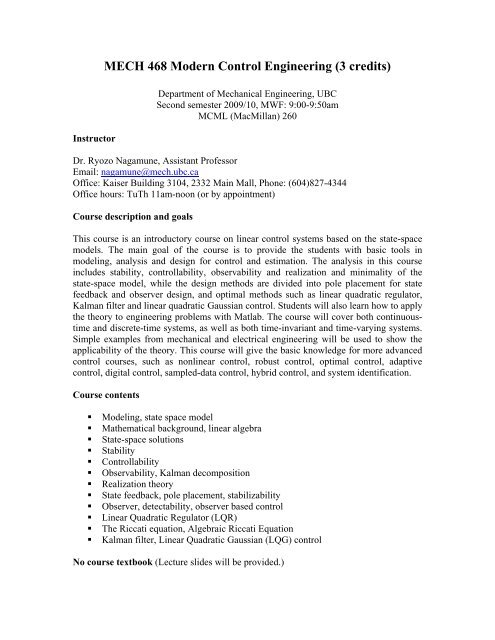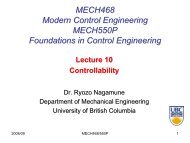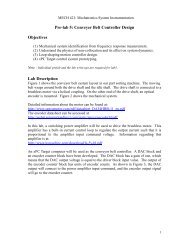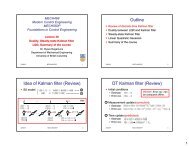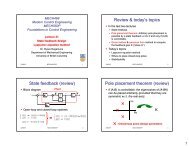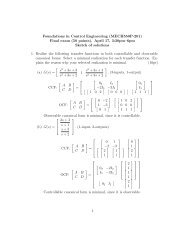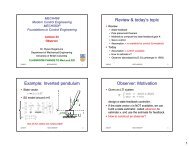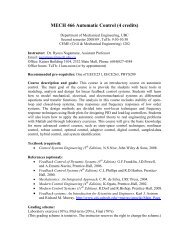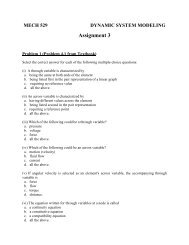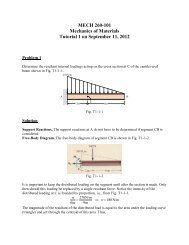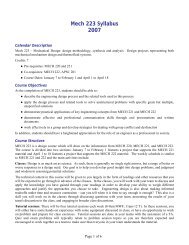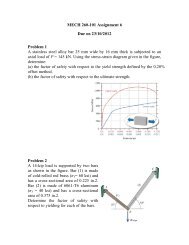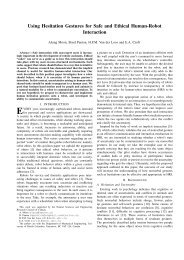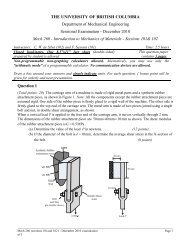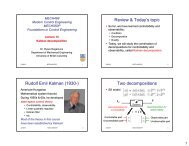Syllabus - UBC Mechanical Engineering
Syllabus - UBC Mechanical Engineering
Syllabus - UBC Mechanical Engineering
Create successful ePaper yourself
Turn your PDF publications into a flip-book with our unique Google optimized e-Paper software.
Instructor<br />
MECH 468 Modern Control <strong>Engineering</strong> (3 credits)<br />
Department of <strong>Mechanical</strong> <strong>Engineering</strong>, <strong>UBC</strong><br />
Second semester 2009/10, MWF: 9:00-9:50am<br />
MCML (MacMillan) 260<br />
Dr. Ryozo Nagamune, Assistant Professor<br />
Email: nagamune@mech.ubc.ca<br />
Office: Kaiser Building 3104, 2332 Main Mall, Phone: (604)827-4344<br />
Office hours: TuTh 11am-noon (or by appointment)<br />
Course description and goals<br />
This course is an introductory course on linear control systems based on the state-space<br />
models. The main goal of the course is to provide the students with basic tools in<br />
modeling, analysis and design for control and estimation. The analysis in this course<br />
includes stability, controllability, observability and realization and minimality of the<br />
state-space model, while the design methods are divided into pole placement for state<br />
feedback and observer design, and optimal methods such as linear quadratic regulator,<br />
Kalman filter and linear quadratic Gaussian control. Students will also learn how to apply<br />
the theory to engineering problems with Matlab. The course will cover both continuoustime<br />
and discrete-time systems, as well as both time-invariant and time-varying systems.<br />
Simple examples from mechanical and electrical engineering will be used to show the<br />
applicability of the theory. This course will give the basic knowledge for more advanced<br />
control courses, such as nonlinear control, robust control, optimal control, adaptive<br />
control, digital control, sampled-data control, hybrid control, and system identification.<br />
Course contents<br />
• Modeling, state space model<br />
• Mathematical background, linear algebra<br />
• State-space solutions<br />
• Stability<br />
• Controllability<br />
• Observability, Kalman decomposition<br />
• Realization theory<br />
• State feedback, pole placement, stabilizability<br />
• Observer, detectability, observer based control<br />
• Linear Quadratic Regulator (LQR)<br />
• The Riccati equation, Algebraic Riccati Equation<br />
• Kalman filter, Linear Quadratic Gaussian (LQG) control<br />
No course textbook (Lecture slides will be provided.)
References (optional)<br />
• Robert L. Williams II and Douglas A. Lawrence, ``Linear State-Space Control<br />
Systems,’’ Wiley, 2007.<br />
• Panos J. Antsaklis and Anthony N. Michel, ``A Linear Systems Primer,’’<br />
Birkhauser, Boston, 2007. (Available online at <strong>UBC</strong> library website)<br />
• Chi-Tsong Chen, ``Linear System Theory and Design’’ Oxford Univ, 1999.<br />
• Brogan, William L,`` Modern Control Theory,’’ Prentice-Hall, 1991.<br />
• Wilson J. Rugh, ``Linear System Theory (2nd Edition),’’ 1995.<br />
• Torkel Glad and Lennart Ljung, ``Control Theory: Multivariable and Nonlinear<br />
Methods,’’ Taylor & Francis, 2000.<br />
• Dan Simon, `` Optimal State Estimation,’’ John Wiley \& Sons, 2006.<br />
• R.F.Stengel, ``Optimal Control and Estimation,’’ Dover Publications, 1994<br />
Homework<br />
Five homework assignments, including Matlab-based computer exercises. A tentative<br />
plan for homework is as follows:<br />
1. Modeling and linear algebra<br />
2. Stability, controllability and observability<br />
3. Kalman decomposition and realization<br />
4. State feedback and observer<br />
5. LQR and Kalman filter<br />
Exams: Mid-term and Final<br />
Policies: Closed-book. Calculators are not allowed. Alternative exams can be arranged<br />
ONLY for medical reasons and with doctor's notes. For other reasons, talk with the<br />
instructor before the exam dates.<br />
Grading scheme (tentative. The instructor reserves the right to change the scheme)<br />
Homework (10%), Mid-term (20%), Final (70%).


